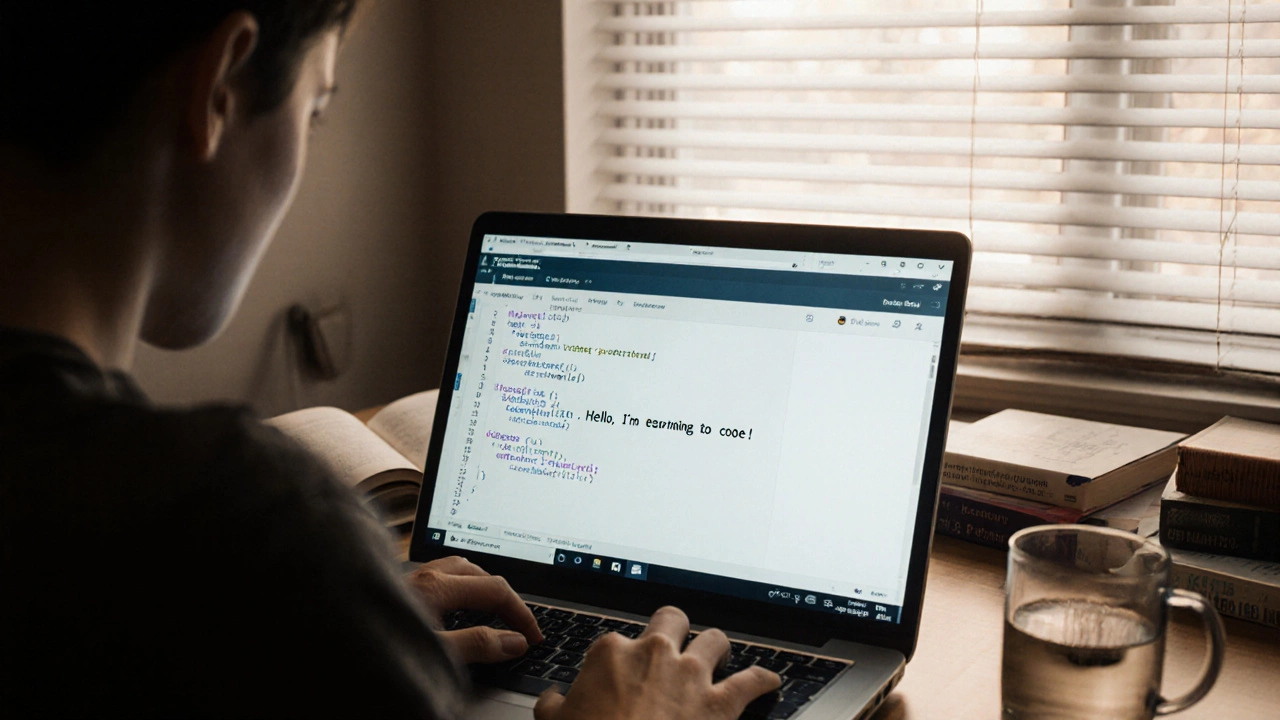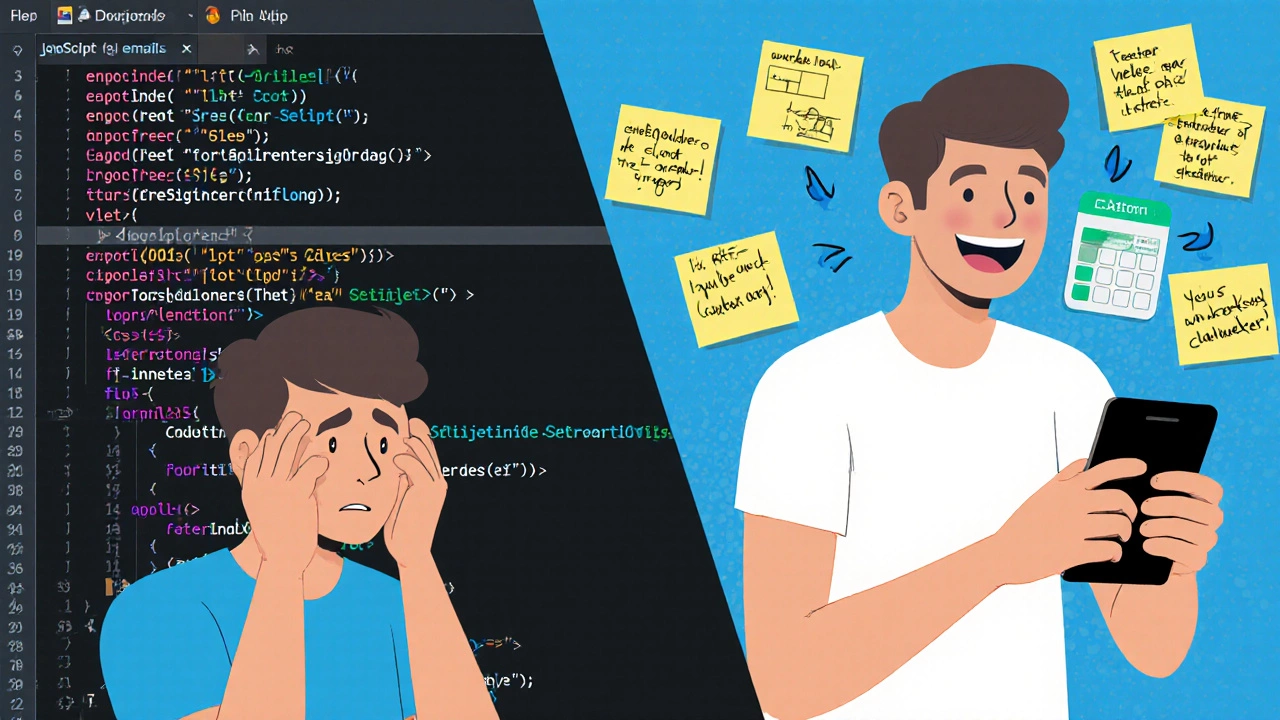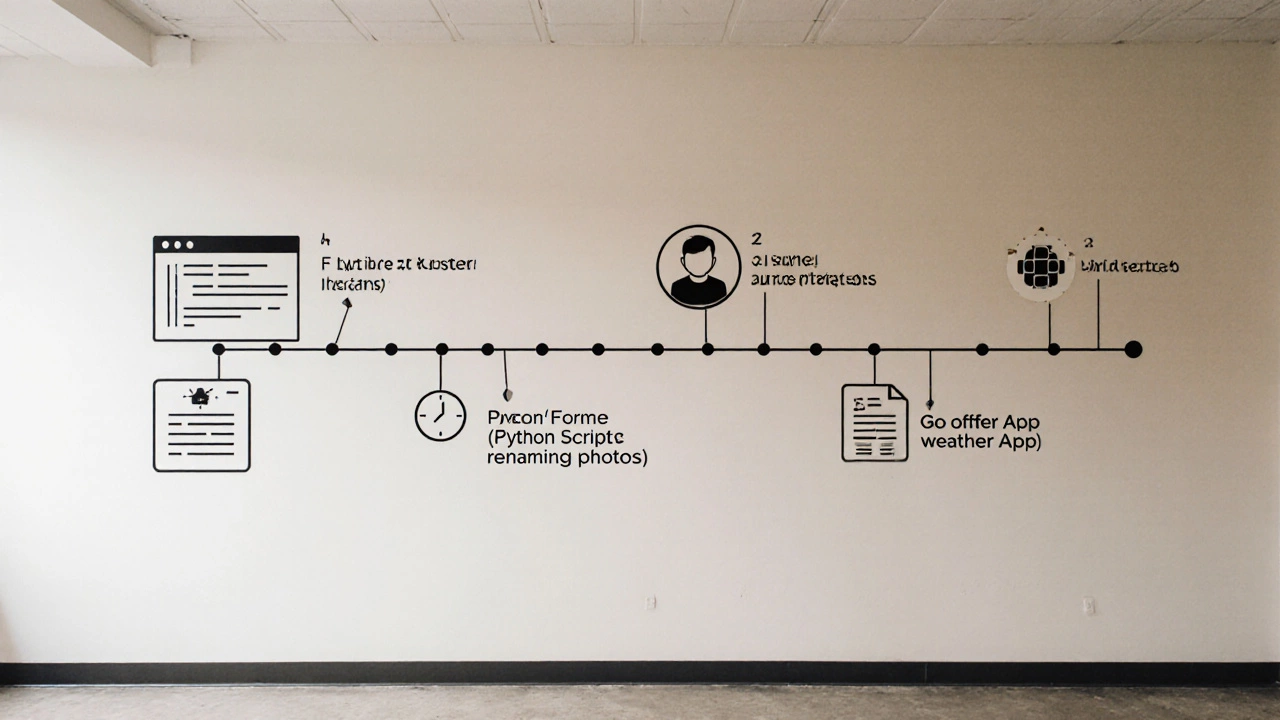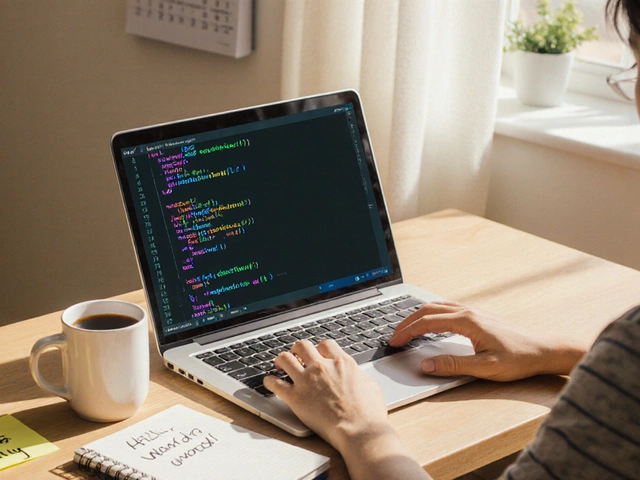Nov
18

- by Dhruv Ainsley
- 0 Comments
Coding Learning Time Estimator
How Long Will It Take to Learn Coding?
Based on your daily commitment, here's your realistic timeline to build skills and land your first job.
Basic Proficiency
First Project Ready
Job-Ready Skills
You’ve probably asked yourself: Can I code on my own? Maybe you’re tired of expensive bootcamps, overwhelmed by course subscriptions, or just don’t know where to start. The truth? Yes, you absolutely can. Thousands of people have built careers, side projects, and even startups by teaching themselves to code-no degree, no classroom, no tuition fees required.
What Does It Really Mean to Learn Coding Alone?
Learning to code on your own isn’t about watching videos and calling it a day. It’s about building things, breaking them, fixing them, and doing it again. People who succeed don’t memorize syntax-they solve problems. They get stuck on a broken button, spend three hours debugging it, and finally make it work. That’s the real learning.Think of it like learning to cook. You don’t become a chef by watching YouTube cooking shows. You burn the first few meals, adjust the salt, try again, and slowly learn what works. Coding is the same. You need to write code, not just read it.
Where to Start: Pick One Language and Stick With It
The biggest mistake beginners make is jumping between languages. Python, JavaScript, and HTML/CSS are the most practical starting points. If you want to build websites, start with HTML and CSS. If you want to automate tasks or work with data, start with Python. If you want to build apps or interactive websites, start with JavaScript.Python is the most beginner-friendly. It reads like plain English. For example:
name = "Alex"
print("Hello, " + name)That’s it. No complex brackets, no semicolons, no confusing syntax. You can run this on your laptop in under a minute using free tools like Python is a high-level programming language known for its simplicity and wide use in web development, data analysis, and automation. First released in 1991, it’s now the most popular language for beginners and professionals alike.. You don’t need to install anything-just go to replit.com and start typing.
Forget Theory, Build Something Real
Most free tutorials waste time explaining computer science theory. You don’t need to know how a binary tree works to build a to-do list app. Start small. Build something you care about.Here are three realistic first projects:
- A personal website with your name, photo, and a short bio (HTML + CSS)
- A calculator that adds and subtracts numbers (JavaScript)
- A script that renames 100 photos in a folder automatically (Python)
These projects take 2-5 hours each. You’ll learn more in one afternoon building a calculator than in three weeks of watching lectures. When you finish, you’ll have something real to show-something you can link to on your resume or social media.
Where to Find Free, High-Quality Resources
There’s no shortage of free learning material. But not all of it is good. Here’s what actually works:- freeCodeCamp is a nonprofit organization offering free coding lessons and projects in web development, data science, and more. Founded in 2014, it has helped over 7 million people learn to code with hands-on projects and certifications. - Complete projects, don’t just click through lessons.
- The Odin Project is a free, open-source curriculum for learning full-stack web development. It’s structured like a real job path, not a random list of videos. - Great if you want to become a web developer.
- MDN Web Docs is the official documentation for web technologies like HTML, CSS, and JavaScript, maintained by Mozilla. It’s detailed, accurate, and constantly updated. - Use this as your reference when you get stuck.
- YouTube channels like Traversy Media, Web Dev Simplified, and Corey Schafer offer clear, no-fluff tutorials on real projects.
Don’t collect resources. Use one. Stick with it until you finish a project.

The Hidden Challenge: Staying Motivated
The hardest part isn’t learning syntax. It’s staying consistent. You’ll hit walls. You’ll feel stupid. You’ll wonder if you’re wasting your time. That’s normal.Here’s how to keep going:
- Code for 20 minutes every day. Not five hours on Sunday. Twenty minutes daily beats a marathon once a week.
- Join a free community. Reddit’s r/learnprogramming, Discord servers, or local meetups in Melbourne. Talking to others who are stuck helps you feel less alone.
- Track progress, not perfection. Did you fix a bug today? That’s a win. Did you write 10 lines of code? That’s progress.
One student I know in Melbourne started coding at 38, while working full-time. He spent 15 minutes a day on freeCodeCamp. After 10 months, he landed a junior developer role. He didn’t study for years. He just showed up.
How Long Does It Really Take?
There’s no magic number. But here’s what most people experience:- Week 1-4: Learn basics. Build a simple page or script. Feel excited.
- Week 5-12: Get stuck. Feel frustrated. Want to quit.
- Month 3-6: Start solving problems on your own. Build your first real project.
- Month 6-12: Can build small apps. Start applying for internships or freelance gigs.
It’s not about speed. It’s about consistency. People who quit usually stop at month 2 or 3-not because they’re not smart enough, but because they expected results too fast.
Can You Get a Job Without Coding Classes?
Yes. Companies care more about what you can build than where you learned it. In 2024, 32% of new software developers in Australia had no formal computer science degree, according to the Australian Bureau of Statistics.Employers look for:
- A GitHub profile with 3-5 real projects
- Clear documentation (what the project does, how to run it)
- Proof you can solve problems-not just copy code
One developer from Sydney got hired at a startup after posting a simple weather app on GitHub. He didn’t go to university. He didn’t pay for a course. He just built something useful and shared it.

What You Should Avoid
There are traps everywhere:- Don’t chase every new framework. React? Vue? Svelte? Learn HTML, CSS, and JavaScript first.
- Don’t binge tutorials. Watch one, then build.
- Don’t compare yourself to others. Someone who’s been coding for five years isn’t your competition-you’re competing with your past self.
- Don’t wait for the "perfect" time. Start now. Even if it’s just 10 minutes.
Final Thought: You Don’t Need Permission
You don’t need a degree. You don’t need a mentor. You don’t need a $10,000 course. All you need is curiosity, patience, and the willingness to keep going when it’s hard.Every expert coder was once a beginner who refused to quit. If you can type on a keyboard, you can learn to code. The only thing standing between you and that first working program is the next line of code you write.
Can I really learn to code without any prior experience?
Yes. Most self-taught coders start with zero experience. The key isn’t background-it’s action. Start with small projects, learn by doing, and don’t wait to feel ready. You’ll learn more in two weeks of building than in two months of watching videos.
How much time do I need to spend each day?
As little as 15-20 minutes a day is enough if you’re consistent. Coding is a skill that grows with repetition, not marathon sessions. Daily practice builds muscle memory. Skipping days makes it harder to get back in. Even 10 minutes of writing code every morning adds up over time.
Is freeCodeCamp enough to get a job?
freeCodeCamp gives you the foundation, but getting a job requires more. You need to build your own projects, put them on GitHub, and be able to explain how they work. Employers care about what you’ve built, not just what courses you completed. Use freeCodeCamp as a starting point, then go beyond it.
What if I get stuck and can’t find a solution?
Getting stuck is part of the process. First, read the error message carefully-it often tells you exactly what’s wrong. Then search Google with the exact error. Most issues have been solved before. If you’re still stuck, ask on Reddit’s r/learnprogramming or Stack Overflow. Be specific: show your code, explain what you expected, and what happened instead.
Do I need a computer science degree to be a programmer?
No. Many tech companies now hire based on skills, not degrees. In Australia, over a third of new developers in 2024 didn’t have a CS degree. What matters is your ability to solve problems, write clean code, and ship projects. Build a portfolio, and your degree becomes irrelevant.
Should I learn Python or JavaScript first?
It depends on what you want to build. If you want to automate tasks, analyze data, or work in AI, start with Python. If you want to build websites or apps that users interact with, start with JavaScript. Both are great for beginners. Python is simpler to read; JavaScript is essential for the web. Pick one and stick with it for at least three months.
Can I learn coding while working a full-time job?
Absolutely. Many people learn coding in the evenings or on weekends. It takes time, but it’s doable. Focus on small wins: one project a month, 15 minutes a day. Progress adds up. One person I know learned to code while working night shifts. After 14 months, they switched careers. You don’t need to quit your job-you just need to show up consistently.
Next Steps: Your First Move
Don’t wait for the perfect plan. Here’s what to do right now:- Go to replit.com and create a free account.
- Choose Python as your language.
- Type:
print("Hello, I'm learning to code!")and run it. - That’s it. You just coded.
Now go do it. Tomorrow, build something small. The next day, fix a bug. The day after that, share it with someone. You don’t need to be perfect. You just need to begin.





